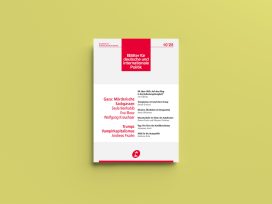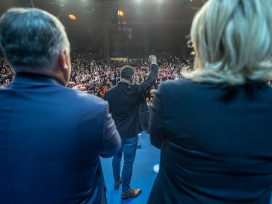How much in common must a community have? Quite a lot, says Eurozine’s Carl Henrik Fredriksson. At the very least a common public sphere. Because without it, Europe’s publics will be easy prey for those who know how to play the strings of history.
With 19.7 per cent of the vote, the Freedom Party of Austria (FPÖ) contributed significantly to the far-right surge in the 2014 European elections. Though the party’s performance fell short of its leadership’s expectations, the FPÖ gained as much as 7 per cent and two additional seats in the European Parliament compared to the 2009 elections. Only France’s National Front (25.0 per cent) and the Danish People’s Party (26.6 per cent) attracted more voters in the far-Right camp.
This was the latest in a series of electoral successes for the FPÖ since Heinz-Christian Strache was elected chairman in 2005, following a split with Jörg Haider, who went on to found a new political party (the Alliance for the Future of Austria, BZÖ). Most, if not all, of the campaigns that helped Strache re-establish the FPÖ as one of Austria’s leading political parties have in one way or the other focused on Turkey and Turkish immigrants. In the run-up to the recent European elections, one of the rhyming campaign slogans was the somewhat blunt “Türkei nicht dabei”, keep Turkey outside! But it started much earlier – and in a rhetorically more sophisticated manner.
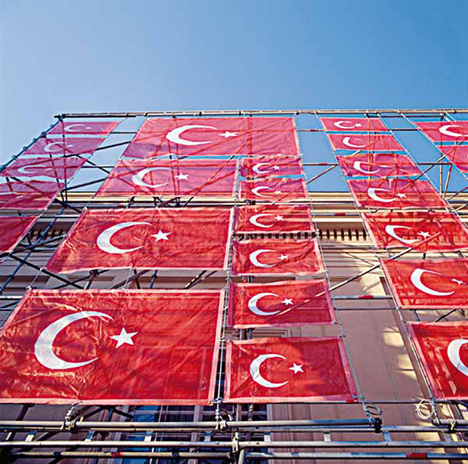
Kanak Attack: The Third Siege of Vienna?
On 7 March 2005, German writer and artist Feridun Zaimoglu opened his installation “Kanak Attack: Die dritte Türkenbelagerung?” at the Vienna Kunsthalle. Zaimoglu, who is of Turkish origin, had dressed the walls of the former stables of the Habsburg Empire, now the centrepiece in Vienna’s Museumsquartier, in 420 blood red Turkish flags.
A similar installation in Zaimoglu’s German hometown Kiel had passed without much ado. Vienna, however, was an altogether different matter. It didn’t take long before the public was mobilized: for and against Zaimoglu’s “provocation” – mostly against. The Berliner Zeitung reported that the Viennese, described as being “deeply traumatized since 1683”, were in shock. The FPÖ called on the director of the Kunsthalle to step down. Strache himself demanded that the project be stopped and asked what the Turks would have said if the Hagia Sophia had been wrapped in Austrian flags. Newspaper articles were illustrated with photoshopped images of the St. Stephan’s Cathedral with the cross at the top of the tower replaced by a crescent. And a slogan was launched: “Wien darf nicht Istanbul werden.” Vienna must not become Istanbul.
A few years earlier, FPÖ – then under Haider – had used a similar formulation: “Wien darf nicht Chicago werden!” That slogan was central to a classic law-and-order campaign, making use of the cliché of Chicago as a kind of Gotham City, suffering under organized crime, gangland problems and a high homicide rate. But this was something else: “Wien darf nicht Istanbul werden.” Everyone – or at least more than enough people – knew what was at stake. It was 1683 all over again and high time to show who was “ein echter Wiener”, a real Viennese.
The emotive reference to the Turkish sieges of Vienna (1529 and 1683) was no novelty in Viennese and Austrian politics; there are numerous examples of how these historical events have been reactivated in the present as vehicles for projecting contemporary fears and political programmes. In 1895, mayor-to-be Karl Lueger launched his election campaign by noting that “today we remember Vienna’s liberation from the Turks, and let’s hope that we’ll be able to ward off a woe that is even greater than the Turkish danger, namely the woe of Jews”. More than a hundred years later, and almost 500 years after the first siege of Vienna, the ground for FPÖ’s 2005 campaign was prepared by Kurt Krenn, Bishop of St. Pölten, who launched the concept of a “third Turkish siege” when he told the Oberösterreichischen Rundschau in 2002 that “we’ve already had two Turkish sieges, and now there’s a third. It’s just of a different type.” And this one, he added, is even more “dangerous”, since it comes from within.
These were the “good and evil spirits” that Feridun Zaimoglu brought to life on his projection screen, the flags on the walls of the Kunsthalle. And the resonance was strong, so strong that no spin-doctor would have been able to neglect it. With a campaign revolving around the slogan “Wien darf nicht Istanbul werden”, the FPÖ got 14.8 per cent of the vote in the 2005 municipal elections in Vienna. This was less than the party had received four years earlier, but considering the volatile situation after the split with Haider, the emotionally charged campaign certainly helped Strache to avert a much bigger loss.
Viennese waltz in Luxembourg – and Istanbul
That very same autumn the debate about opening EU membership talks with Turkey reached its peak. Shortly before the decisive EU summit in Luxembourg, due to take place at the beginning of October 2005, 24 member states were for, only one against: Austria. Foreign minister Ursula Plassnik, who insisted that an alternative to full membership be written into the text regulating the negotiations, was under pressure from all sides. In the night of Monday 3 October, after having secured a fast track for Croatia into the EU, Plassnik finally gave up and her Turkish colleague Abdullah Gül could get on a plane to Luxembourg to join the celebrations.
The next day – under the headline “Viyana Valsi”, Viennese waltz – Turkey’s biggest daily newspaper Hürriyet wrote: “Two times in history we have had to turn around at the gates of Vienna. Now we go to Europe on the road of peace and cooperation.” In an accompanying analysis, Hürriyet wondered whether Austria’s stubborn resistance should be explained as a classic “small-country syndrome” or simply as just as classic xenophobia – or indeed as a untreatable trauma that lingers on, long after the Turkish sieges of Vienna.
In fact, the headline of center-left daily Milliyet the same day – “Vienna has fallen!” – suggests that there might be traces of such a trauma in Istanbul as well. For it is hard to interpret this triumphant proclamation as anything other than an expression of relief at the late gratification, the long due compensation for a historical defeat. Milliyet was setting the record straight.
The reference is the same: 1683, the second siege of Vienna. And it is no doubt a potent reference in both Turkey and Austria. The perspectives, however, are exact opposites. The interpretative matrixes in which the reference gets its meaning are so different from each other that it is almost impossible to think of them as parts of one and the same system, of the same public sphere. And yet, that is exactly what we have to do.
Turkey might be further away from EU membership today than it was ten years ago, but that does not make the differences between Turkish and Austrian publics any less relevant. When the decision to open accession negotiations was taken in Luxembourg in 2005, Turkey had already been an associate member of the European Economic Community, a predecessor of the European Union, for 42 years. Turkey was one of the first countries to become a member of the Council of Europe in 1949 and is a founding member of the OSCE. The futures of Turkey and Austria – and every other European country – are inevitably intertwined. But their public spheres are not. Not yet. Equally divergent perspectives are the rule, not the exception, all over Europe.
The European public sphere: A complex task of translation
The Europeanization of identities and frames of reference still seems like a far-off dream. But the long-term prospects for a more meaningful European community hinge on the emergence of those very trends. Notwithstanding that identity is constructed, it would not only be futile but also dangerous to try to prescribe to Europeans a certain potentially hegemonic narrative that should fit all contexts and account for what is in fact a multitude of social, economic, political and historical experiences. However, divergent historical narratives remain one of the most difficult challenges facing anyone who wants to contribute to the emergence of a European public sphere.
EU enlargement in 2004 made the narrative gap painfully visible. In Western Europe, 1945 constitutes both a starting point and an ending point: Never again! That was the founding impetus of the European integration project, beginning with the Coal and Steel Community. In Eastern Europe, however, 1945 was neither an ending nor a starting point; it was an intermediary moment between two oppressive systems, signifying little more than the transition from Nazi rule to Soviet rule. “The future of European solidarity,” writes Timothy Snyder, “depends on a rethinking of the immediate European past. Without historical knowledge of the East, European mass publics will be swayed by simple arguments flowing from national prejudice. European leaders, whether they know the facts or not, will be tempted to resort to such arguments in the whirl of domestic political competition.”
But instead of a Grand European Narrative dictated from above, the only way to bridge this gap goes via the public sphere. What Jan-Werner Müller has described as the “humdrum” task of European intellectuals – to be a little bit more curious and “see the rewards in the work of translation and mediation” – is in fact the new democratic raison d’être of the battered press.
For decades, pundits lamenting the lack of a European public sphere have put their hopes in the emergence of new, pan-European media. In vain. Jürgen Habermas, the most prominent advocate of the idea that the public sphere plays a pivotal role in the legitimation of any democratic system, has been one of them. However, in a speech to a social democratic conference in Berlin earlier this year, Habermas claimed that “for a supranational democracy that is still rooted in nation-states, we do not need a European ‘people’, but individual citizens, who have learnt that they can be both national citizens and European citizens in one person. And these citizens can very well competently participate in European decision-making in their own national public spheres, if the media only would meet their responsibilities.”
This means that the media must fulfill “a complex task of translation”, Habermas concluded, which involves mutually reporting on the discussions taking place in other countries, representing different perspectives.
It is not difficult to imagine what such “translation” could achieve. What would the answers to the euro crisis have looked like if the Germans had known a little bit more about the Greek civil war and how state bureaucracy was used to reconcile a deeply divided society? Would the eurosceptic party Alternative for Germany (AfD) still have won seven seats in the European Parliament? And, to continue to talk with Jan-Werner Müller, what if the Greeks would have known a little bit more about the historical roots of German Ordoliberalismus and German politicians’ innate fear of inflation?
If the fourth estate should remain a pillar of the democratic system it urgently needs to take on this “complex task of translation”, to open up to ‘foreign’ perspectives. Politics is no longer limited to the nation-state, while the standpoint of the media – including the value system on which journalists base their coverage – is still almost exclusively national. Such a media landscape can never provide the foundations for a united society.
How much in common must a community have? we asked at a recent Eurozine conference. As it turns out: quite a lot. At least a common public sphere – even if this is just a series of nationally based but interconnected media spaces. Because without it, Europe’s publics will be easy prey for those who know how to play the strings of history to further polarize European societies. In Vienna and Istanbul, in Paris and Budapest there are plenty of those, and they claim that they are playing the tune of the future.
Published 21 November 2014
Original in English
First published by IWMpost 113 (2014)
Contributed by IWMpost © Carl Henrik Fredriksson / Eurozine
PDF/PRINTNewsletter
Subscribe to know what’s worth thinking about.
Related Articles
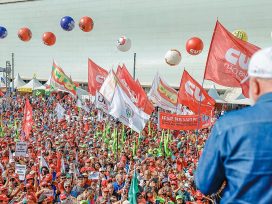
While Lula has managed to stabilize the Brazilian economy and restore some key social programs, these gains remain fragile under the weight of fiscal conservatism, an uncooperative legislature, and a political environment saturated by disinformation. Were the right not in disarray, his position would be much weaker.
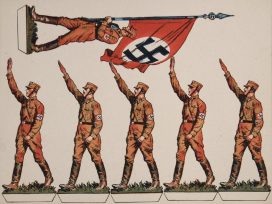
The nexus of radical inequality, social atomization and male victimhood has been exploited before. But why now, on such a scale? To understand the appeal of the far right today we need to examine the origins of the fascist myth of primordial male kinship.




